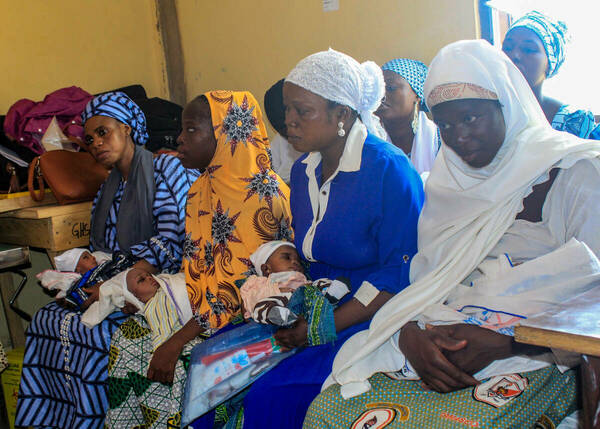Approach

Development
In order to appropriately assess the needs of the community and identify perceived gaps in postpartum care, we held focus group discussions in the setting in which this intervention was to take place, involving postpartum women in communities who attend postnatal care at the four health centers we planned to work with. Through these discussions, we found that women reported: baby-focused care during the postpartum period, inadequate knowledge of post-birth warning signs, barriers to accessing postpartum care, struggles with mental health after birth, and a need for improved postpartum education. These results clearly established the need to develop a more integrated, mother-centered model of care in this setting, and thereby greatly informed the development of our intervention.
We developed a new, integrated postpartum care model entitled Focused-PPC, which includes small groups of participants who meet regularly to receive clinical care, education, and support for up to one year after birth. Ghana Health Service was engaged and a step-by-step process followed to develop the Focused-Postpartum Care Project in Tamale, Ghana. The process included: 1) inception meetings with Ghana Health Service, 2) content development workshop, 3) Focused-Postpartum Care guide development and review, 4) creation of audio and visual content, and 5) translation of content into local language.
Need for the Project
Although the Ghana Health Service (GHS) recommendations exist for postnatal care (PNC) of mothers and babies, there is a considerable focus on the newborn during PNC, leaving a gap in the quality of care that is afforded to the mother. This contributes to maternal deaths in the region. The practice needs to be to schedule the newborn and mother visits to the health facility simultaneously, as many times, the interactions between midwives and mothers are not comprehensive, and/or only offered on an “as needed basis”. Thus, the Focused-PPC intervention provided standardized postpartum care for the mother, in addition to care of the newborn. The findings of this study will yield insights for improvements in the standard of care for mothers in healthcare facilities in Ghana. The ultimate goal is to reduce maternal mortality and morbidity, and alleviate negative postpartum health outcomes, some of which can disrupt mother/ infant bonding.
Randomized Controlled Trial in Tamale
We implemented a Randomized Controlled Trial (RCT) that was parallel in design with balanced randomization (1:1) across 4 health centers in Tamale, Ghana: Choggu Health Center, Kanvilli Health Center, Bagabaga Health Center, and Kalpohin Health Center. An adequate sample size was calculated to be 192 participants. Thus, a total of 48 participants were recruited from each health center. At each facility, participants were randomly assigned into 3 Focused-PPC Intervention groups and 3 control groups. Control groups received the standard postnatal care regimen currently practiced in the health centers. This standard involved individual postnatal care visits at the health center within 14 days after birth, at 6 weeks after birth, and monthly child welfare clinics for up to one year after birth. Intervention groups received the Focused-PPC integrated model of care. Each Focused-PPC group consisted of 8 postpartum women, and led by two trained and registered midwives, and a project assistant. Midwives provided care and education to these groups of women and their infants, and project assistants were present to provide support. Each Focused-PPC session incorporated recommended clinical assessments and health counseling for approximately 15 minutes, followed by an hour of targeted education and peer support. Translated audio and visual educational materials were used to support the content taught in Focused-PPC sessions. Participants were also encouraged to voice their personal concerns and share their unique experiences in the vulnerable time after birth.
The Focused-PPC intervention incorporated three vital aspects of postpartum care, delivered in a group setting, meant to positively impact maternal health outcomes: 1) recommended health assessments by trained midwives at specific time points postpartum, 2) education sessions following a standardized curriculum, and 3) peer support from other postpartum women. These three aspects of care were implemented through Focused-PPC sessions, each involving eight postpartum women, held at 1-2 weeks post-birth, six weeks post-birth, and monthly thereafter for up to one year post-birth. This model of care differed from the current standard of care, received by the control group, in that it included more frequent and consistent clinical assessment, more comprehensive and standardized education, and built-in peer support.
All participant data were collected via interviewer-administered electronic surveys. The main outcomes monitored throughout this study were: knowledge of post-birth warning signs, postpartum health status (including measures of clinical data and mental health screening), and postpartum health behaviors. We also collected data related to the feasibility/acceptability, and satisfaction of the intervention itself. The results indicated that participants receiving the Focused-PPC intervention experienced notable benefits compared to the control group, including: enhanced knowledge of post-birth warning signs, increased confidence in their ability to recognize complications, less mental health burdens over time, and higher uptake of favorable health behaviors such as healthy diet and family planning. Overall, we found Focused-PPC to be a feasible, evidence-based standard of care with great potential to improve maternal outcomes.